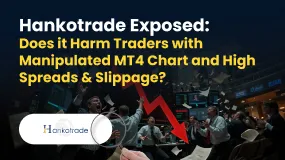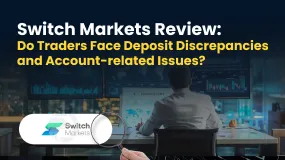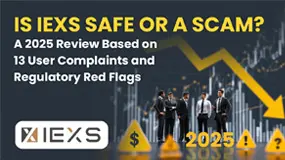简体中文
繁體中文
English
Pусский
日本語
ภาษาไทย
Tiếng Việt
Bahasa Indonesia
Español
हिन्दी
Filippiiniläinen
Français
Deutsch
Português
Türkçe
한국어
العربية
Are We in a Retracement Or the Start of a Financial Collapse?
Abstract:As markets fluctuation in uncertain times and headlines grow darker, investors are left asking a crucial question: Is this a temporary downturn or something far worse? The terms bear market, recession, and depression are often thrown around interchangeably, but they represent very different levels of economic pain. Read this article to understand the differences between all three.

As markets fluctuation in uncertain times and headlines grow darker, investors are left asking a crucial question: Is this a temporary downturn or something far worse? The terms bear market, recession, and depression are often thrown around interchangeably, but they represent very different levels of economic pain. Read this article to understand the differences between all three.

A bear market is defined by a decline of 20% or more from recent highs in major stock indices. Its usually sparked by shaken confidence: concerns over interest rates, corporate earnings, or geopolitical risks. While unsettling, bear markets are often short-lived compared to broader economic downturns.
Retail traders should view bear markets as a stress test for strategy. This is not the time for panic-selling. Instead, reassess your risk tolerance, rebalance portfolios, and consider accumulating strong assets that may be temporarily undervalued.

A recession cuts deeper. It involves a sustained slowdown in economic activity, typically marked by two consecutive quarters of negative GDP growth. During recessions, we see rising unemployment, consumer retrenchment, and slumping business confidence. The damage extends beyond markets – it affects everyday life.
In this phase, central banks often respond with stimulus, but recovery can be uneven. Traders may benefit by shifting towards defensive sectors like healthcare, consumer staples, or utilities, and staying alert to monetary policy changes that affect interest rate-sensitive assets.

A depression is not just a deeper recession – it's a prolonged economic collapse. The most infamous example, the Great Depression of the 1930s, lasted nearly a decade and redefined global finance. Severe contractions in output, extreme unemployment, and widespread bankruptcies define this grim reality.
While modern safeguards have made depressions less likely, they are not impossible. For investors, the focus must shift from profit to preservation: high cash reserves, minimal leverage, and ultra-conservative asset choices. It's about surviving first, thriving later.

Historical Comparison of Bear Markets, Recessions, and Depressions
The real truth is, no can guarantee what happens next in the market. By the time it‘s clear whether we’re in a bear market, a recession, or worse, it may be too late to act. Thats why preparation is more essential than prediction.
To stay resilient in times of uncertainty, retail investors should adopt a disciplined and strategic approach. Diversification is key because not all assets react the same way to market shocks, spreading exposure across different sectors and global markets can help cushion losses. Maintaining liquidity is equally important; having enough cash on hand allows investors to take advantage of sudden opportunities or weather financial setbacks. Employing stop-loss strategies with care can also protect capital when emotions run high and markets turn volatile. Rather than reacting to headlines, investors should pay close attention to hard data such as unemployment figures, inflation rates, and central bank policy updates which often provide clearer signals of economic direction. Above all, maintaining a long-term perspective is crucial: while short-term downturns can be painful, they often present the foundation for future growth when navigated wisely.

Disclaimer:
The views in this article only represent the author's personal views, and do not constitute investment advice on this platform. This platform does not guarantee the accuracy, completeness and timeliness of the information in the article, and will not be liable for any loss caused by the use of or reliance on the information in the article.
Read more

Hankotrade Exposed: Does it Harm Traders with Manipulated MT4 Chart and High Spreads & Slippage?
Have you witnessed a manipulated MT4 chart on Hankotrade login, showing inaccurate trading figures? Have you been victimized by high swap fees, inflated spreads, and massive slippage? Is the payment processing time too long at Hankotrade? Do you face downtime issues, especially when the New York trading session is on? These are some top complaints against the Belize-based forex broker. In this article, we have shared these complaints. Take a look!

Cloudflare Outage Disrupts Broker Websites and Crypto Platforms
Cloudflare outage causes widespread disruption to broker websites and crypto platforms, highlighting risks in web infrastructure reliance.

Switch Markets Review: Do Traders Face Deposit Discrepancies and Account-related Issues?
Do you fail to deposit your funds into the Switch Markets forex trading account? Earned profits, withdrew them too, but did Switch Markets block your deposits? Wanted to close your trading account due to payment-related issues, but in turn got your emails blocked by the Australia-based forex broker? Faced a negative trading account balance because of illegitimate trade order execution? Many traders have shared these stories about Switch Markets on broker review platforms. In this Switch Markets review article, we have mentioned the same. Read on!

Is IEXS Safe or a Scam? A 2025 Review Based on 13 User Complaints and Regulatory Red Flags
You're asking a direct and important question: Is IEXS safe or a scam? As someone who might trade with them or already does, this is the most important research you can do. While IEXS says it is a global broker with over ten years of experience, a detailed look at its regulatory status and many user reviews shows serious warning signs that cannot be ignored. The evidence suggests a high-risk situation for traders' capital. This review will examine the available information, from official regulatory warnings to concerning first-hand user complaints, to give you a clear and fact-based view of the risks involved in trading with IEXS. Our goal is to give you the facts you need to make a smart decision.
WikiFX Broker
Latest News
CQG Partners with Webull Singapore to Power the Broker’s New Futures Trading Offering
【WikiEXPO Global Expert Interviews】Ashish Kumar Singh: Building a Responsible and Interoperable Web3
IEXS Review 2025: A Complete Expert Analysis
CySEC Flags 21 Unauthorized Broker Websites in 2025 Crackdown
FONDEX Review: Do Traders Really Face Inflated Spreads & Withdrawal Issues?
IEXS Regulation: A Complete Guide to Its Licenses and Safety Warnings
Does WealthFX Generate Wealth or Losses for Traders? Find Out in This Review
WinproFx Withdrawal Problems: A Complete Look at Delays and User Reports
FXPrimus Review: Is FXPrimus Regulated and Reliable for 2025?
Simulated Trading Competition Experience Sharing
Currency Calculator



